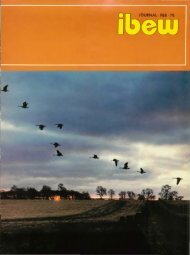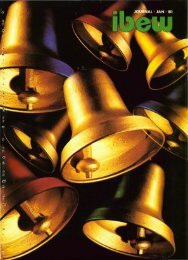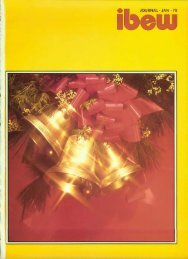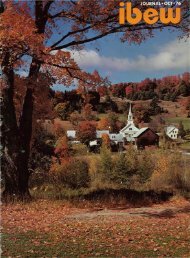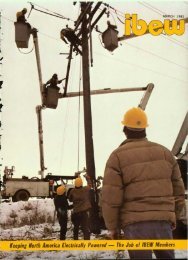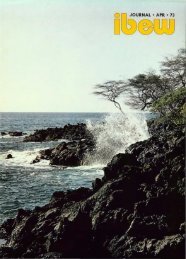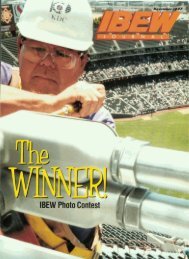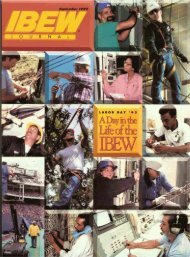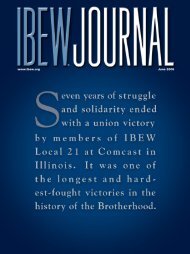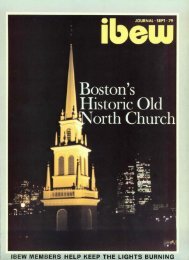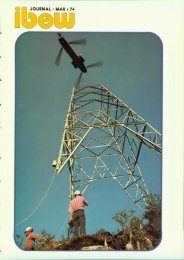t - International Brotherhood Of Electrical Workers
t - International Brotherhood Of Electrical Workers
t - International Brotherhood Of Electrical Workers
You also want an ePaper? Increase the reach of your titles
YUMPU automatically turns print PDFs into web optimized ePapers that Google loves.
The Journal of ELECTRICAL WORKERS and Operalors<br />
COLLECTIVE BARGAINING<br />
<strong>Workers</strong><br />
understand process underlving<br />
trade compacts<br />
al Between A'at ion<br />
nadei ig ' ee eni<br />
l<br />
it eoneessions on it, the<br />
United States proIduced agricultural machinery<br />
-12.2 pIr cent greater ill value<br />
thal was produced in the pre-agreement<br />
yeaI M9P/5. A titul of 32.2 per cent nore<br />
man-hours' uf labor was proviled for<br />
American witrkers in this industry in<br />
DuiniIl the lihst ilvth Secretary Hall<br />
arid i}heIth }aVe' oli1peari'd be1fore the Sen- 1937 Ihai in 119:5. In 1937, 30.4<br />
aIte<br />
per eent<br />
F[ueit ](elatjtions Committee to de- or e<br />
scribe<br />
w9ge<br />
thiearners<br />
lioc-s<br />
were employed<br />
andl to kln<br />
making<br />
for an<br />
agriultural nmachinery than were<br />
extiellsuo<br />
so em-<br />
of the ITth d Agreement. Act. plyd two years before ...<br />
laboir his been enlangle d in tii situa- "There were ,1 6 million Imoe miar-<br />
[ion. Willim Green, prslidunt of the hours of labor directly employed<br />
CORDEIL M. LIlUI<br />
A nericil,<br />
in nmn-<br />
Flederalion of Labor, has made<br />
ufa-titring<br />
He tliarul es (or more<br />
it<br />
iatIonl<br />
lear<br />
agricultural mnachinery<br />
lIde<br />
that<br />
It-lI<br />
the<br />
for<br />
Atmericani Federation export in 1938 tLIhan there were<br />
of Labor<br />
in 1935.<br />
is rot opp.sed to tile trade But before these THE<br />
agreement<br />
4.6 million<br />
word awmeeiritnt<br />
program.<br />
hous<br />
Labor<br />
of<br />
is used<br />
leders<br />
freq-iltly<br />
sit- work could<br />
to<br />
ting<br />
bei<br />
dsri<br />
in<br />
p<br />
trbe<br />
Miami,<br />
ormed,<br />
iodi<br />
Fie.<br />
other<br />
coi<br />
this<br />
work<br />
.Plnlts<br />
ontnlh are<br />
in the<br />
d is- vas provided<br />
THull ers.ing<br />
ii producing<br />
trade program.<br />
this important<br />
raw materials<br />
Thihs is<br />
problem.<br />
nIot<br />
and transporting them<br />
cident, iasnlieh<br />
Let<br />
to where<br />
as<br />
us look<br />
the<br />
theii lull<br />
at<br />
ma<br />
what<br />
process<br />
Mr. Illl<br />
of<br />
did in chinery was mlanufiactureld.<br />
the<br />
After<br />
setting<br />
case<br />
the<br />
of<br />
Pia-<br />
uip<br />
our<br />
trade<br />
neighbor<br />
eIclaIetS<br />
to<br />
ivelves<br />
the south,<br />
nego<br />
chinery was<br />
Brazil.<br />
made. there<br />
In<br />
tiations<br />
the<br />
was employment<br />
agreement<br />
with which<br />
of<br />
labor<br />
1935<br />
is l<br />
with<br />
inliar under<br />
for railruad workers,<br />
Brazil,<br />
for<br />
the<br />
the<br />
United<br />
truck<br />
tern<br />
States<br />
drivers<br />
collective<br />
agreed<br />
bargaininig.<br />
to keep<br />
Rpre-<br />
I and stevedores in connection<br />
91 per cent<br />
with<br />
sentativrs,<br />
of<br />
its<br />
the<br />
frol<br />
imports<br />
tWO nations<br />
on the free<br />
sit down to-<br />
shipiment. Thse things<br />
gether, discuss their<br />
list,<br />
naturally<br />
trailde<br />
and<br />
problems<br />
to<br />
in-<br />
redue<br />
ind<br />
duties on 2.5 per cent<br />
beginl to<br />
oC<br />
adjust<br />
the<br />
volvred<br />
differences<br />
imports.<br />
lmuch<br />
The<br />
just<br />
United<br />
elommunication,<br />
as rep-<br />
States low-<br />
which<br />
)rovildd<br />
resentativesened<br />
vork<br />
the duty<br />
for stenographers,<br />
of workers<br />
by ione-half<br />
le[rks<br />
ind ermplayers<br />
on minganese<br />
iand<br />
sit down<br />
ore,<br />
for<br />
to<br />
Brazil<br />
postil,<br />
negotiate<br />
nuts<br />
telephone<br />
and<br />
an agroemant.<br />
castr<br />
and<br />
hean.<br />
telgraph<br />
It<br />
In employees',"<br />
is the<br />
return<br />
process<br />
Brazil<br />
of peace<br />
agreed<br />
and<br />
to<br />
it<br />
reduce<br />
is the<br />
duties Dr. Terry goes<br />
heart of<br />
oil<br />
on<br />
the<br />
28<br />
to<br />
Hull<br />
tariff<br />
explain<br />
trade<br />
items<br />
program.<br />
affecting<br />
what<br />
It is the<br />
imports con- the "most-favored-nation"<br />
ig la rgely from<br />
lause<br />
the United<br />
really<br />
opposite<br />
States. These<br />
to var.<br />
means in the<br />
The<br />
items<br />
Hull<br />
Congressional<br />
included<br />
program:<br />
automobies,<br />
Act under which<br />
certain<br />
Mr.<br />
kinds 'Moreover, the most-favored.nation<br />
of machinery, fresh<br />
11u1<br />
fruit<br />
carries<br />
and<br />
on his<br />
cereals.<br />
healing and importsit<br />
larrangement is an excellent bargain for<br />
service is called the Trade Agreemnnts L,1ABOR BENEFITS<br />
us, in thit it gives us advantage of ilore<br />
Act. To uiderstand its goal and its ne-<br />
tariff concessions than we grant. As illiiseessity,<br />
one merely needs to turn back To date trade agreement h)ave been trative. D)pairtient of State ealeula-<br />
the pages of history a little For the last sitned with 21 different countries. }Lw lions. based on figures for 1934, show<br />
50 yea's nations have been operating doas all this affect American lhbor? This Ameriiu iaiports which were subject to<br />
upon protective tariff policy as dislin is an important qui*1tion. Dr. Isad r inreaset by vihtue of lion areeenlnt<br />
guished from free trade. A tariff is noth- Labin, Comn,issioner of Labor Statistic, countrios taking advantage of concessions<br />
trig more than a tax on i.coni. g products told the House Ways and Mean. Corn nmade in agreements amounted to Some<br />
in order to enable inanUfar(trers of sinli- mirtee that $00,000 jobs directly and $30,000,00(10. American exports which, belar<br />
products at home to undlersell to the countless othes indirectly hall been cause of the r..ist favored-nation, I icey,<br />
domestic consuner his foreign eompelti- created as a result of the recjpr..cal trade were given the benefits of p,,ferential<br />
tots. Mr. Hull does not oppose taiffs. agreements. I)r. ulin doubted i single duties which would not othlerwie iaply<br />
lie mrelyf points out that there is a tdif- American worbman had lon hi job be to Anlmeriall ploducts aimounel t. p,lerenee<br />
between tarifs as revenue and cause of ay concesslins granted to a mroxinlately $2(5.000.000. Thus. we gave<br />
tariffs as nlstruentii 8 f economic foreign country. Dr. .ubin stressed the benerfits on $3f0<strong>Of</strong>00.00' of trade and ie<br />
wlafare.<br />
fact that 17 I ndustritis had benefited from ceived benefits on $265,000,000 of tara.<br />
thie trade agreenmnt progiina.<br />
PUTTING<br />
In<br />
GATES<br />
this "'Ars ealirpies f how the most-f .vored-<br />
IN WAILS<br />
listing he placed electrical mliiufaeturaoion clausi in the i.re..enn Is has<br />
During the great war of 1914 .i.i to ing, radios anild phonographs, ils well as served to remove diselhnimiations agairst<br />
tihe present, tariffs starting out to be automobiles, faundry machine shop piod- Armeeiean trade: Ill the agreemen which<br />
in many instances tariffs fir rLeveue beacts, agricultura inpl.ments. tires and became .ieeftive .June 15, 1936. France<br />
caLe ins'truments of e.o.nomic aggres- tubes, hardware, stoves, rubber goods. first granted us must-favored-rLItion<br />
sion. In short. file atlo..ks of thie woId, wiir, textile machinciery. cash register treatmeit. Consequently, we wre aide to<br />
while they were talking peace, began to typewriters. rubiber ootl and shos,. rest take advalntage of prefereitial duties not<br />
build w alls ar-oinnd themselves--tariff iron pipes, cutlery and edged tools previously- available to us in respect L to<br />
waflls that l srt r g ed internat.inal Recently the Carnegie Endowment for 4.328 tariff posilions. Canada phrigede us<br />
trade. Mr. Hull as a great diplomat has I[ateriatiral Peaet dfistriburtd a panm- most-favored-nrd-ation treatment in the<br />
not undlertkaken to tear dlow,, these [liff phh in alo ... g Aleican trade unionists agreenient which becanie effetive 3rnar-<br />
walls, lie merely tri-s t put a gate by J. Willam Terry enlltitled "Arnerican ary 10 16, and in consequence loweted<br />
here aniI a gate there or lift a ladder ,Labor and the Trade Agreements.' This duties that Canada had granted cer-<br />
over the edifice ii, order tI let a little pamphlet takes much the same point of tain other counitries bretine alplicable<br />
trade trickle through or hoist commn.odi- view as Dr. Lubir. Dr. Terry uldertakes to imports from the United States on 600<br />
ties abve obstruetions and thius ease the to present figurs to utpo)pohi Is thesis: itoen ..<br />
impossiele situaltin.<br />
"In 1937, after eight c tr. ies had<br />
ContHinued il L pac I0N



